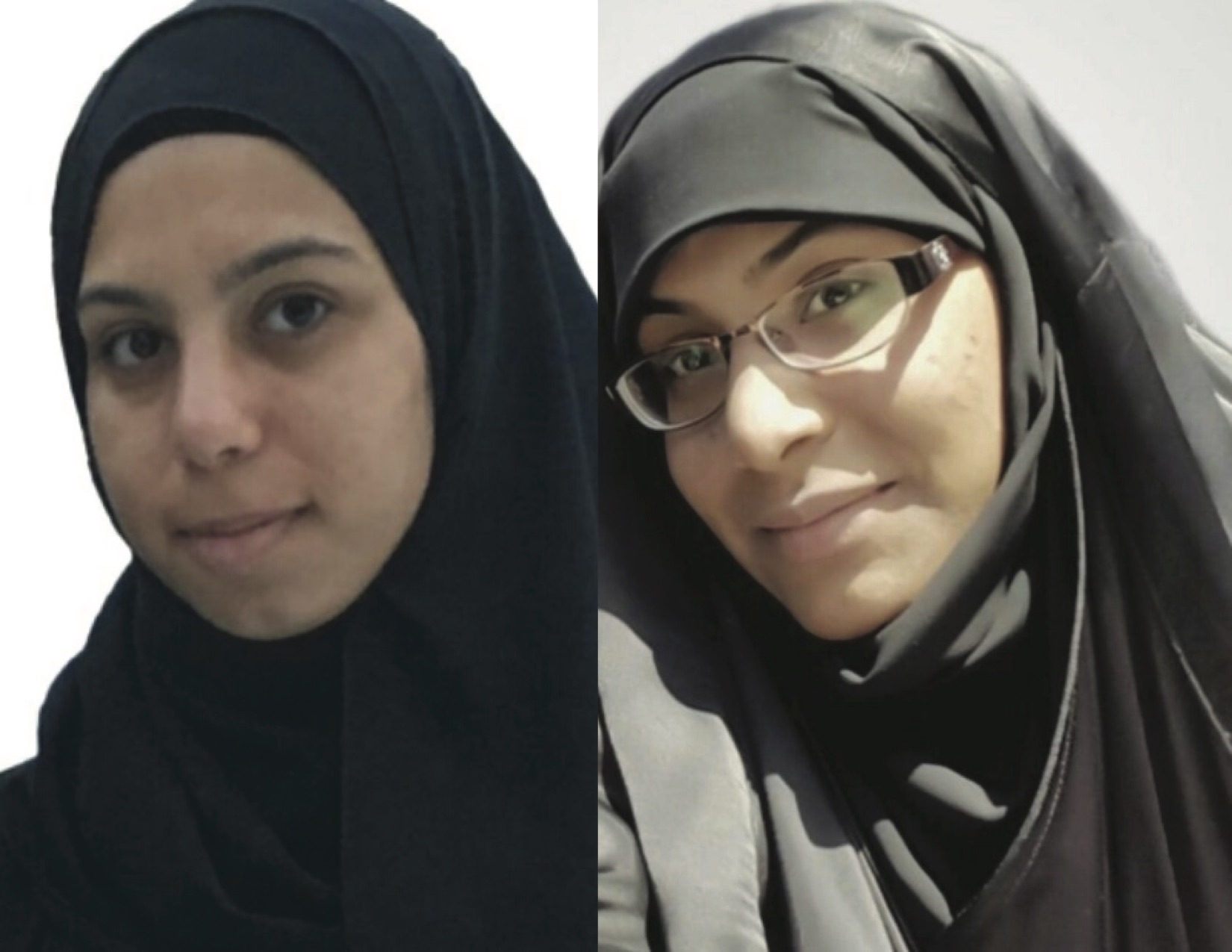Zakeya Isa AlBarboori, a 30-year-old chemical engineer, and her niece Fatema Dawood Juma, a 19-year-old student at Bahrain University, were recently subjected to an enforced disappearance of more than three weeks, as they were detained by government officials who failed to disclose their fate and whereabouts. Only after this period of nearly a month were they able to inform their families of their location.
On 18 May 2018, officers in plain clothing and armed commando forces entered Fatema’s home without a warrant. Approximately 15 masked officers entered the home at 3:00am after barricading it with a number of security vehicles and landing helicopters on the roof.
The officers searched Zakeya’s room for ten minutes without allowing the family to enter, and then arrested her. The officers left the home, only to return and arrest Fatema. Officers confiscated Fatema’s laptop and cell phone, along with Zakeya’s car. When the family asked for information concerning the reason for the arrest, the officers responded that Fatema and Zakeya would be questioned at the Ministry of Interior’s Criminal Investigations Directorate (CID).
At approximately 5:30am that day, Zakeya and Fatema called their family and informed them that they were being held in the CID. The call only lasted for a few seconds. After the call, Fatema’s father went to the CID, but the officers refused him entry and threatened him.
On 19 May 2018, officers returned to the home around 4:00am and searched Zakeya’s room for another hour, again without a warrant. The officers refused to inform the family of the reason for the search, would not allow them to approach the room, and would not clarify the reasons for the arrests of the previous day.
On 5 June 2018, the Office of Public Prosecution (OPP) contacted Fatema’s lawyer and asked her to be present at the OPP to be informed of the charges against Fatema. The hearing took place at approximately 4:00am, but Fatema’s lawyer was not given the case file until six hours later. Fatema’s lawyer was able to speak with Fatema following the hearing, but neither spoke to nor saw Zakeya. Zakeya was presented to either a judge or public prosecutor without any lawyer or prior notice, despite her lawyer previously informing the OPP that she was Zakeya’s legal counsel. At 10:30am, local news reported that the OPP had decided to extend their detention for a month further.
The family received no official notification of their whereabouts, and were not able to speak with either woman until almost a month after their arrest, on 14 June. Officers at the CID, juvenile detention officers, and officers at the women’s prison in Isa Town all denied having the women in their custody when asked for information on their location.
On 15 June 2018, Zakeya was sent to the women’s prison in Isa Town, where she was able to see and have contact with her family for the first time since her arrest, although for just 30 minutes. During this time, it was revealed that Zakeya was held in solitary confinement for 28 days, and authorities subjected her to tremendous pressure during interrogation. Officers questioned her for the first six days of her disappearance.
Fatema was first able to visit with her family on 16 June 2018, almost a month after her arrest. She was also held in solitary confinement for 28 days, and also lost weight during this period.
The charges brought against Fatema and Zakeya are: the presence of explosives in the house; receiving funding from Iran; and membership in Tayar Al-Wafa Al-Islami (typically referred to in English as al-Wafa), an unlicensed political opposition group which the Bahraini government recognizes as a terrorist organization.
On 27 June 2018, Fatema was released from the Women’s Prison in Isa Town, and the charges against her were dropped. Fatema is a student majoring in physical fitness, and due to her imprisonment, she missed her end-of-year exams. Zakeya is still being detained, and has no previous criminal record, having only participated in licensed demonstrations.
Fatema and Zakeya have been subjected to an enforced disappearance, as government officials deprived them of liberty against their will and failed to disclose their fate and whereabouts. Additionally, the multiple entries to and searches of their home without a warrant or other legal grounds to do so violate the right to privacy in Article 12 of the Universal Declaration of Human Rights (UDHR) and Article 17 of the International Covenant on Civil and Political Rights (ICCPR).
Further, because these women were arrested from their home without a warrant, Bahrain’s actions against Fatema and Zakeya constitute arbitrary detention and therefore violate Bahraini and international law, including Article 9 of the ICCPR, to which Bahrain is a party, and the UDHR.
ADHRB calls upon Bahrain to uphold its human rights obligations by excluding any evidence acquired without a warrant, and ensuring that any subsequent trial of Zakeya is consistent with due process and fair trial rights. We additionally urge the authorities to keep Zakeya’s family informed of their status and welfare, while allowing the families to visit and speak with her.





